8x8 Contact Center Click-To-Dial API
Overview
The 8x8 Contact Center Click-To-Dial API is a HTTP API that allows logged-in agent to perform outbound call by launching an external URL. The typical usage of Click-To-Dial is to create clickable hyperlink on CRM record to dial out on corresponding customer phone number.
This document describes the supported parameters for running Click-To-Dial. Example use cases are provided for references.
The API request is authenticated using client cookie. Only agent with valid 8x8 Agent Workspace session will be able to run Click-To-Dial API. Click-To-Dial API can only successfully run on the browse window that sharing the AGUI session.
For security reasons, the Click-To-Dial API only accepts request using HTTPS, so that request headers and response data are encrypted.
Testing Using A Browser
The Cick-To-Dial API makes it easy to submit a query, for experimentation, testing or debugging purposes. From a web browser, simply enter the URL. You will be promted to close the window. In the meantime, the correspoding agent phone will be ringed. Once agent answer the phone, destination phone will ring. For example,
https://vcc-na4.8x8.com/AGUI/make_call.php?prefix=1&phone=6502928880
will call the destination number 16502928880.
Revise your query URL based on the login URL of your Tenant. (Refer to the Platform URL Guide to retrieve your login URL)
Query Parameters
GET Parameters
The following parameters are allowed GET parameters passing along with the click-to-dial URL. All the GET parameter data should be URL encoded.
| Parameter Name | Description | Accepted value |
|---|---|---|
| prefix | Calling Phone Number Prefix | Digit only. |
| phone | Calling Phone Number | Any phone number (formatted or non-formatted). |
| callerId | Caller id to make the outbound call. | Any existing phone channel number. Digit only. |
| dialplan_id | Dial Plan Id that should be applied to the Phone Number. | Digit only. A valid dial plan id. Id can be found from the Dial Plan listing table on Configuration Manager. If not specified, tenant default dial plan is used. It is an optional field. |
| queue_id | Outbound queue id to make the call along with. Agent will become busy when the call established with the queue. Corresponding TCL will be applied along with the queue. | Digit only. A valid queue id. Id can be found from the Queues listing table on Configuration Manager. It is optional field. |
GET/POST Parameters
The following parameters are allowed parameters that can be passing along with the click-to-dial URL using GET or POST method.
| Parameter Name | Description | Accepted value |
|---|---|---|
| ctl_userdata | A set of name/value pair data to trigger desired action. | Refer to Section 'ctl_userdata' below. |
| extTransactionData | A set of name/value pair data to associate CRM record with auto log. | Refer to Section 'extTransactionData' below. |
extTransactionData
The exTransactionData allows tenant to pass in associated record ID and record and record type the click-to-dial call is triggered from. The extRecordId and extRecordType are usual to link the call log generated by the ctl_action automatically. Please refer to section 'Create Action' below for an example. However, the association can only applied for tenant using Enhanced SFDC integration.
The format of the value of extTransactionData looks like the following:
extTransactionData=[extRecordId|value1][extRecordType|value2]
ctl_userdata
The ctl_userdata allow tenant to pass in any user data or system data to trigger supported click-to-dial related action. The design of ctl_userdata is to allow any combination of name/value data. Each name/value data shall be in the format of [name|value]. There is no limit on how many number of name/value data can be used to compose the ctl_userdata.
The value of ctl_userdata typically looks like the following:
ctl_userdata=[name1|value1][name2|value2][name3|value3]…
The category of name/value data is mainly divided into two groups: system data and user data.
System Data
System data are data recognized by Contact Center. All the name of the data that starts with 'ctl_' are treated as system data. The following table shows the list of supported system data with description.
| Data Name | Description | Supported value | Default Value | Remarks |
|---|---|---|---|---|
| ctl_action | Action command | create | No system default value. | If not specified, no action is taken in Virtual Contact Center system. |
| ctl_intType | Integration Type | sfdc | No system default value. | If not specified, action will be ignored. |
| ctl_launchopt | Launch Screenpop URL after action | true|false | false | Launch Screenpop URL configured |
| ctl_launchext | Launch Screenpop Option | edit | No system default value. | If not specified, the record launched with the URL will be readonly. Value will be ignored if ctl_launchopt is not true. |
| ctl_parentid | Launch Screenpop option with the parented as return URL | valid ID | No system default value. | If not specified, no return URL for launching screenpop URL. |
| ctl_newRecordId | Record ID used by do the launch URL. | valid ID | — | This is appended to the ctl_userdata after create action is finished by the Virtual Contact Center system. Tenant should not specify this. |
| ctl_callbackUrl | The URL to do the callback. All the userdata with system generated result and data will be passing to the URL using POST method. | Any valid URL. | No system default value. | If not specified, no callback will be done. |
| ctl_recordname | The name of the record to launch the window/tab on screenpop window. | No restriction. | This is used together with launchopt = true. If not specified, system will generate name for the new window/tab for launching screenpop. |
User Data The user data are the data that for performing 'ctl_action' specified. The name of the user data should never start with 'ctl_' or it will be treated as system data. Contact Center only process the user data only with known 'ctl_action' and 'ctl_intType'. Refer to Examples below to find out what user data would look like. User data is mostly for recording information of the related activity (in this case, click-to-dial). Therefore, Contact Center provides a list tokens that can be used in user data. Tokens will be replaced by the actual data before it's used in the action or posting to the launch URL. The following is the list of supported tokens with description.
| Token name | Description |
|---|---|
| $caller_id$ | The caller ID used to do the outbound call. |
| $transaction_id$ | Transaction ID associated with the outbound call. |
| $call_answered_time$ | UTC Call answered time in seconds. If call is not established, a number of 0 is used. |
| $call_hangup_time$ | UTC Call hang up time in seconds. If call is not established, a number of 0 is used. |
| $callAnsweredTenantTT$ | Call Answered Timestamp in tenant timezone in the format of YYYY/MM/DD HH:mm:ss Z. |
| $callHangupTenantTT$ | Call Hangup Timestamp in tenant timezone in the format of YYYY/MM/DD HH:mm:ss Z. |
| $callDuration$ | Call Duration in the format of HH:MM:SS |
| $equal$ | The token will be replaced actual '='. |
| $interaction_guid$ | Interaction GUID of the interaction associated with the outbound call. |
| $year$ | The current year in the format of YYYY. |
| $month$ | The current month in the format of MM. |
| $date$ | The current date in the format of DD. |
| $hours$ | The current hour in the format of HH. |
| $minutes$ | The current minute in the format of MM. |
| $seconds$ | The current second in the format of SS. |
| $transaction_codes$ | Selected transaction codes. The format is <transaction list name>:<transaction shortcode> separated by commas if more than one is selected. The corresponding text can be found by using the mapping downloaded from Virtual Contact Center stat API. |
| $notes$ | The small notes along with Transaction Code selected entered by agent. |
| $lastTclListName$ | The transaction code list name of the last selected transaction code. |
| $lastTclCodeDesc$ | The transaction code description of the last selected transaction code. |
| $lastTclCodeShort$ | The short code of the last selected transaction code. |
Create Action
Create action triggers creation of new record in CRM with integration type specified. The current version of Contact Center application only support create record on SFDC.
Launch Option
Launch option 'ctl_launchopt' is for launching Screen pop URL with the following name/values screenpop data post. Launch Option is allowing value either 'true' or 'false'. It is only taking effect if Screenpop is enabled on the Configuration Manager. This option is independent of the ctl_action specified.
| Data Name | Description |
|---|---|
| CtlUserData | The original ctl_userdata with all tokens filled with actual data. |
| AgentID | Agent login ID |
| Username | Agent External Username entered to AGUI |
| extLogin | Agent External Username entered to AGUI |
| Password | Agent External password entered to AGUI |
| extPwd | Agent External password entered to AGUI |
| Account | Account ID configured in Screenpop section of the Configuration Manager |
| Role | Screen pop target type configured in Configuration Manager. |
| Command | Screen pop command. For this case, 'launch' is the value. |
| cmd | Screen pop command. For this case, 'launch' is the value. |
Callback URL
Callback URL 'ctl_callbackUrl' triggers callback action when click-to-dial transaction completes. The callback action is independent with other action specified in the user data. The following table shows the data that will be post to the callback URL specified.
It is only taking effect if Screen pop and Auto Logs for Phone Media is enabled in Configuration Manager, Integration, Screen Pop.
| Data Name | Description |
|---|---|
| ctl_userdata | The original ctl_userdata passing in to the Contact Center Application with the click-to-dial URL with all the tokens replaced by actual data. Ctl_newRecordId will be appended to the ctl_userdata if the ctl_action is used and new record is created successfully. |
| resultCode | The result of the ctl_action. The possible values are: 'SUCCESS', 'FAIL' or 'IGNORE'. |
| errorString | The error message for the failure action. |
Examples
Example 1
The following URL shows the custom link that can be used to trigger creation of 'Task' record on SFDC for the 'account' record that the click-to-dial running on.
https://vcc-na4.8x8.com/AGUI/make_call.php?prefix=&phone={!Account.Phone}&callerId=5251990&ctl_userdata= [ctl_action|create][subject|outbound%20call%20log%20($transaction_id$)][Transactionid__c|$interaction_guid$]
[ObjectType|Task][WhatId|{!Account.Id}][status|completed][Description|My%20Own%20Description%0Acall%20
answered%20at$equal$%20$call_answered_time$%0Acall%20hangup%20at:%20$call_hangup_time$%0ATransaction%20
Codes%20$equal$%20$transaction_codes$][ctl_parentid|{!Account.Id}][ctl_launchopt|true][ctl_launchext|edit][ctl_intType|sfdc][ActivityDate|$year$-$month$-$date$]
The result of the URL will make an outbound call to the phone number specified in the phone field of the corresponding 'Account' record. After the outbound call is completed, all the tokens will be replaced by actual data. Then, a task record with subject, description, status, transactionid__c, whatid and activitydate is created. After creation operation is done, screenpop window will be launched with the newly created task record in edit mode. Agent can modify and save the record or simply cancel the change to go back to the parent record.
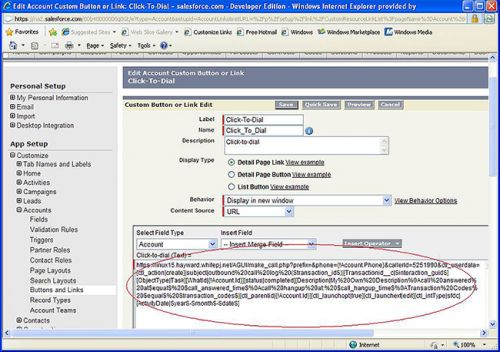
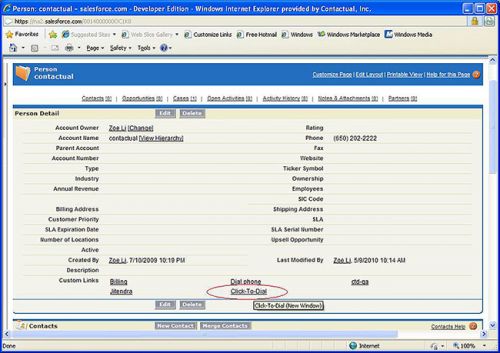
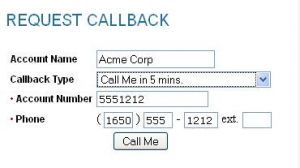
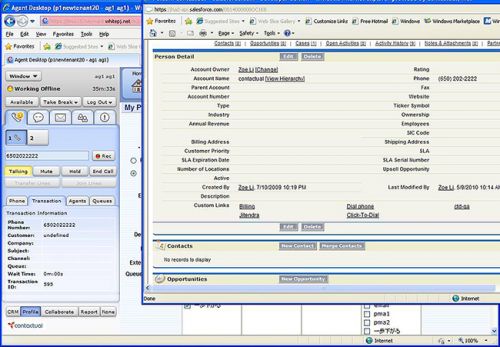
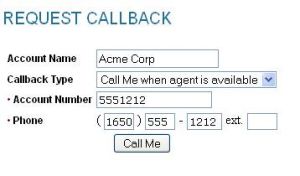
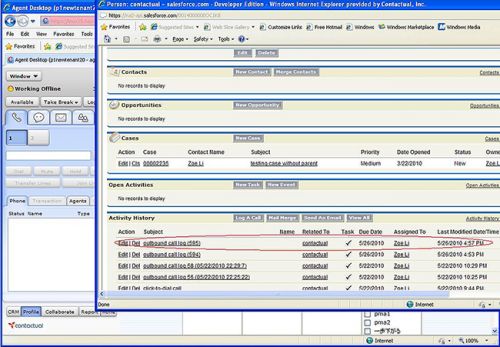
Example 2
The following URL shows the click-to-dial link that can be used to trigger screenpop to post click-to-dial configured data to screenpop URL.
https://vcc-na4.8x8.com/AGUI/make_call.php? prefix=1&phone=6502022222&ctl_userdata=[foreign_key|12345678] [Transactionid|$interaction_guid$][start_time|$call_answered_time][end_time|$call_hangup_time$] [transaction_codes|$transaction_codes$][ctl_launchopt|true][customer_id|123456567]
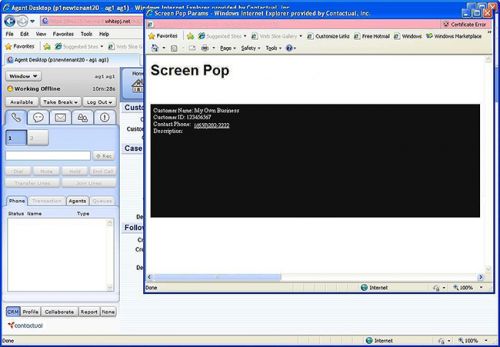
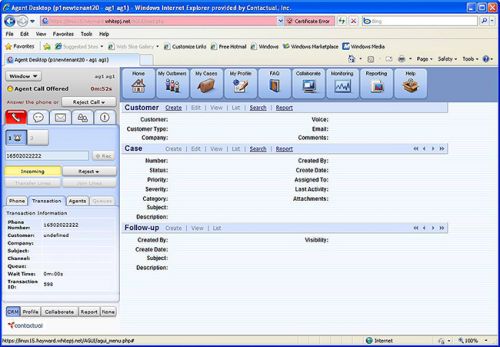
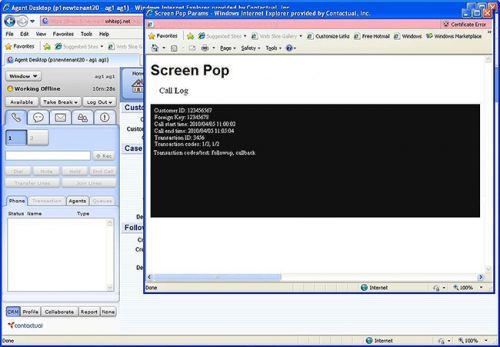
Example 3
The following URL shows the click-to-dial link that can be used to perform outbound call and trigger callback to the URL specified.
https://vcc-na4.8x8.com/AGUI/make_call.php? prefix=&phone=5355566234&ctl_userdata=[foreign_key|12345678] [Transactionid|$interaction_guid$][start_time|$call_answered_time][end_time|$call_hangup_time$] [transaction_codes|$transaction_codes$][ctl_callbackUrl|http://www.mycompany.com/clicktodial/callback? transaction=$transaction_id$]
